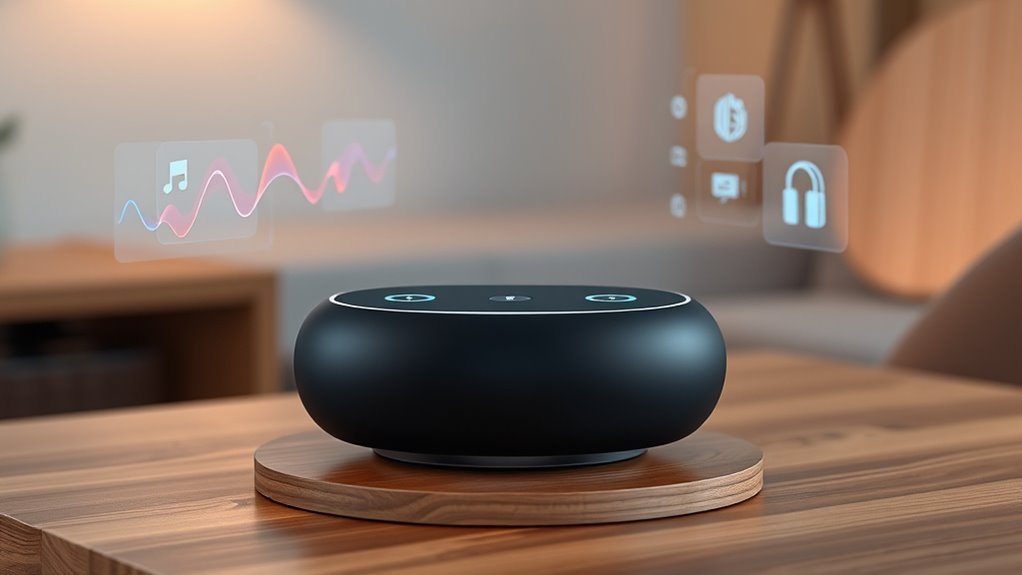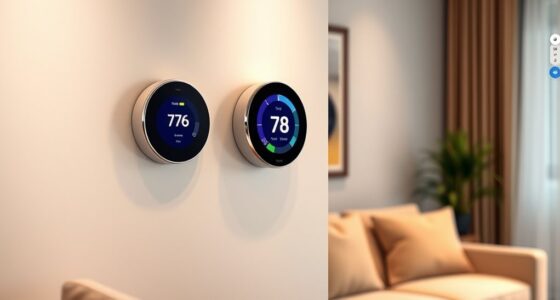By 2025, your smart speakers with AI assistants will be much more intuitive and personal. They’ll understand your commands even if you don’t speak perfectly and will recognize who’s talking to give tailored responses. They’ll learn your routines and preferences, anticipating your needs and managing complex tasks effortlessly. These assistants will become proactive, seamlessly integrating into your everyday life. Keep exploring to see how these intelligent devices will transform your connected home experience.
Key Takeaways
- Voice recognition technology now accurately understands commands without requiring perfect speech or repetition.
- Smart speakers personalize responses by recognizing individual users and learning their habits over time.
- Enhanced predictive modeling enables assistants to anticipate needs and suggest actions proactively.
- They can handle complex, multi-task requests and adapt to evolving routines seamlessly.
- Integration creates a connected home environment, making smart speakers more proactive and indispensable.

Have you ever wondered how AI assistants have become such an integral part of daily life? It’s because they’ve become smarter, more intuitive, and deeply personalized. At the core of this evolution is voice recognition technology, which enables your smart speaker to understand and respond to your commands accurately. You no longer need to speak perfectly or repeat yourself; these assistants can pick up on your tone, pronunciation, and even the context of your requests. This breakthrough means you get faster, more reliable responses, making your interactions feel natural and effortless. As voice recognition improves, your smart speaker can differentiate between family members, adjusting responses and preferences accordingly. Whether you’re asking for the weather, playing music, or scheduling appointments, it recognizes who’s speaking and tailors its replies based on previous interactions. This ability transforms a simple device into a personalized assistant that feels like it truly understands you.
Additionally, ongoing advancements in predictive modeling enable these assistants to better anticipate your needs based on your habits and past interactions, further enhancing their usefulness and personalization. Personalization features have taken a giant leap forward in 2025. Your AI assistant isn’t just a voice-activated tool anymore; it learns your habits, routines, and preferences over time. It anticipates your needs, offers suggestions, and even adjusts settings without you asking. For example, it might remind you of your favorite morning playlist or suggest a recipe based on your dietary habits. These features create a seamless experience where the device adapts to your lifestyle, making daily tasks easier and more efficient. You can customize commands and preferences, ensuring your smart speaker fits perfectly into your routines. If you have specific preferences, the assistant remembers them and applies them automatically, saving you time and mental effort. This level of personalization makes your smart speaker feel less like a generic device and more like a companion that genuinely understands your unique needs.
The continuous refinement of voice recognition and personalization features means that AI assistants are becoming more than just tools—they’re evolving into intelligent, responsive partners. They can handle complex requests, manage multiple tasks simultaneously, and adapt to your changing routines. The more you interact with your device, the better it gets at predicting what you want and delivering tailored experiences. This evolution isn’t just about convenience; it’s about creating a more connected, intuitive environment where technology seamlessly integrates into your daily life. As these features advance, expect your AI assistant to become even more proactive, insightful, and personalized—making your smart speaker an indispensable part of your home.
Frequently Asked Questions
How Secure Are AI Assistants Against Hacking?
You’re relatively secure with AI assistants, but vulnerabilities exist. They use encryption protocols to protect your data during transmission, making hacking more difficult. Additionally, data anonymization helps safeguard your privacy by stripping personal info from stored data. However, no system is entirely invulnerable—staying updated on security features and being cautious with sensitive information helps you maintain better security against hacking attempts.
Can AI Assistants Understand Multiple Languages Simultaneously?
Did you know that over 60% of smart speaker users want multilingual support? Yes, AI assistants can understand multiple languages simultaneously, making conversations seamless. They use advanced algorithms for real-time translation, so you can switch between languages without pause. This feature helps you communicate more naturally in diverse settings, making your experience more efficient and engaging. With ongoing improvements, AI assistants are becoming smarter at multitasking and understanding multilingual commands effortlessly.
How Do AI Assistants Handle Privacy Concerns?
You can trust that AI assistants handle privacy concerns by following strict privacy policies and prioritizing user consent. They inform you about data collection, ask for permission before sharing sensitive info, and allow you to manage privacy settings easily. Companies continuously improve transparency, so you’re aware of how your data is used. This way, you stay in control, and your privacy remains protected while enjoying the benefits of smart technology.
Are AI Assistants Capable of Emotional Recognition?
Yes, AI assistants are increasingly capable of emotional recognition through advancements in emotional intelligence and sentiment analysis. They analyze your tone, words, and facial expressions to gauge your mood, enabling more empathetic responses. You’ll notice these assistants better understand your feelings, offering support or adjusting their behavior accordingly. This evolution makes interactions feel more natural and personalized, helping you feel truly heard and understood during conversations.
What Are the Limitations of AI Assistants in Complex Tasks?
Imagine a puzzle with missing pieces; that’s how AI assistants struggle with complex tasks. They lack full contextual reasoning and creative problem solving, making it hard to handle nuanced or unpredictable challenges. You might ask them to coordinate multi-step projects, but they often stumble, unable to adapt or think outside the box. Their limitations keep you from relying solely on them for intricate tasks, highlighting the need for human intuition.
Conclusion
So, here you are, trusting your smart speaker to manage your life in 2025, while it’s busy learning your quirkiest habits. Ironically, as they become smarter, we might forget how to simply talk to each other. Your digital assistant might plan your day better than you do, yet it still can’t quite replace a genuine conversation. Who knew that in seeking convenience, we’d end up more dependent on these clever little devices?









